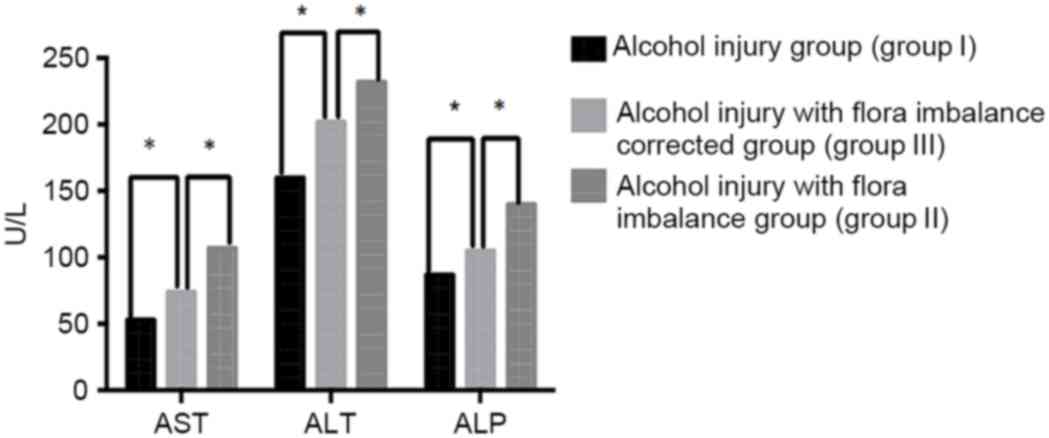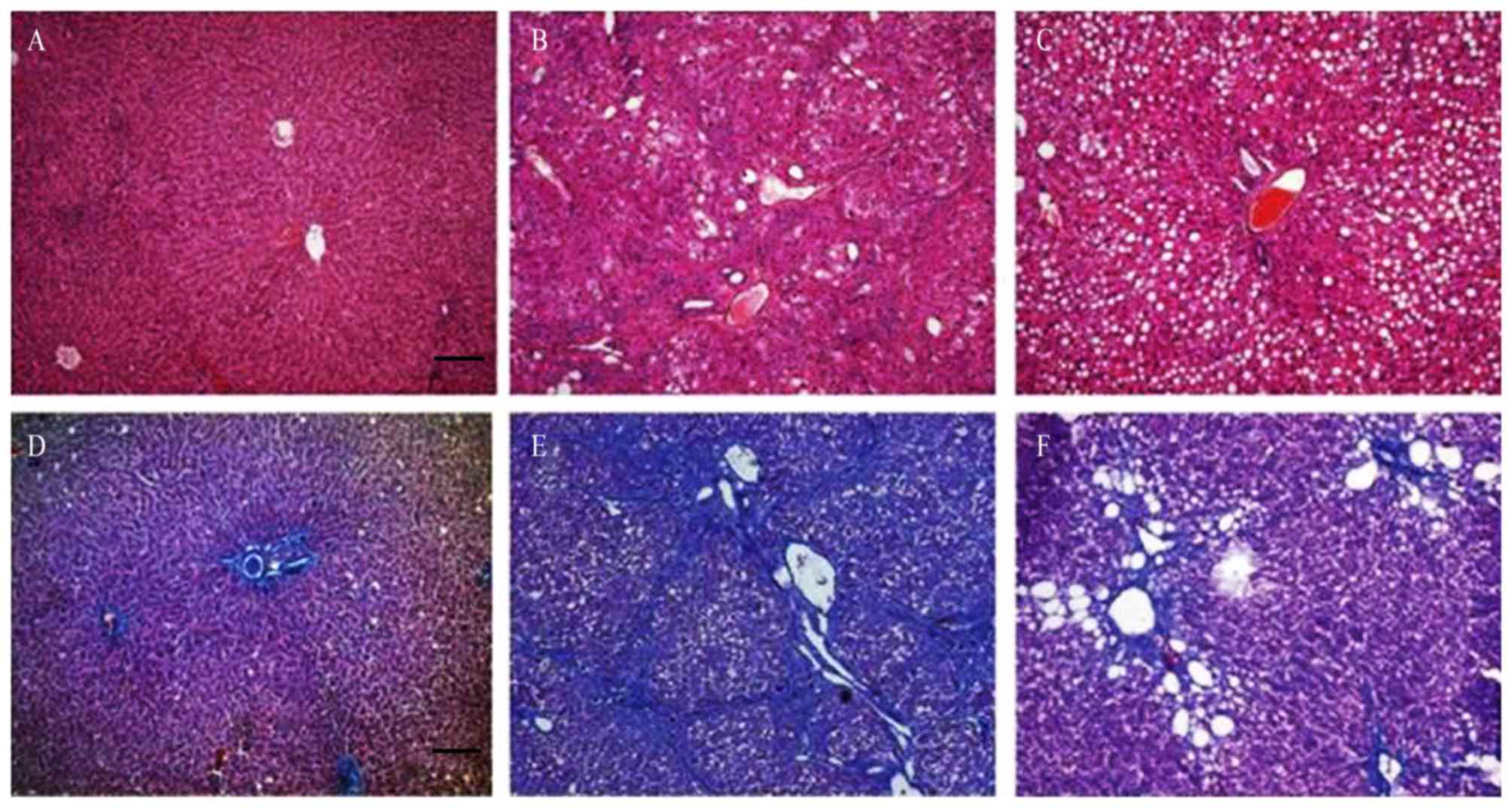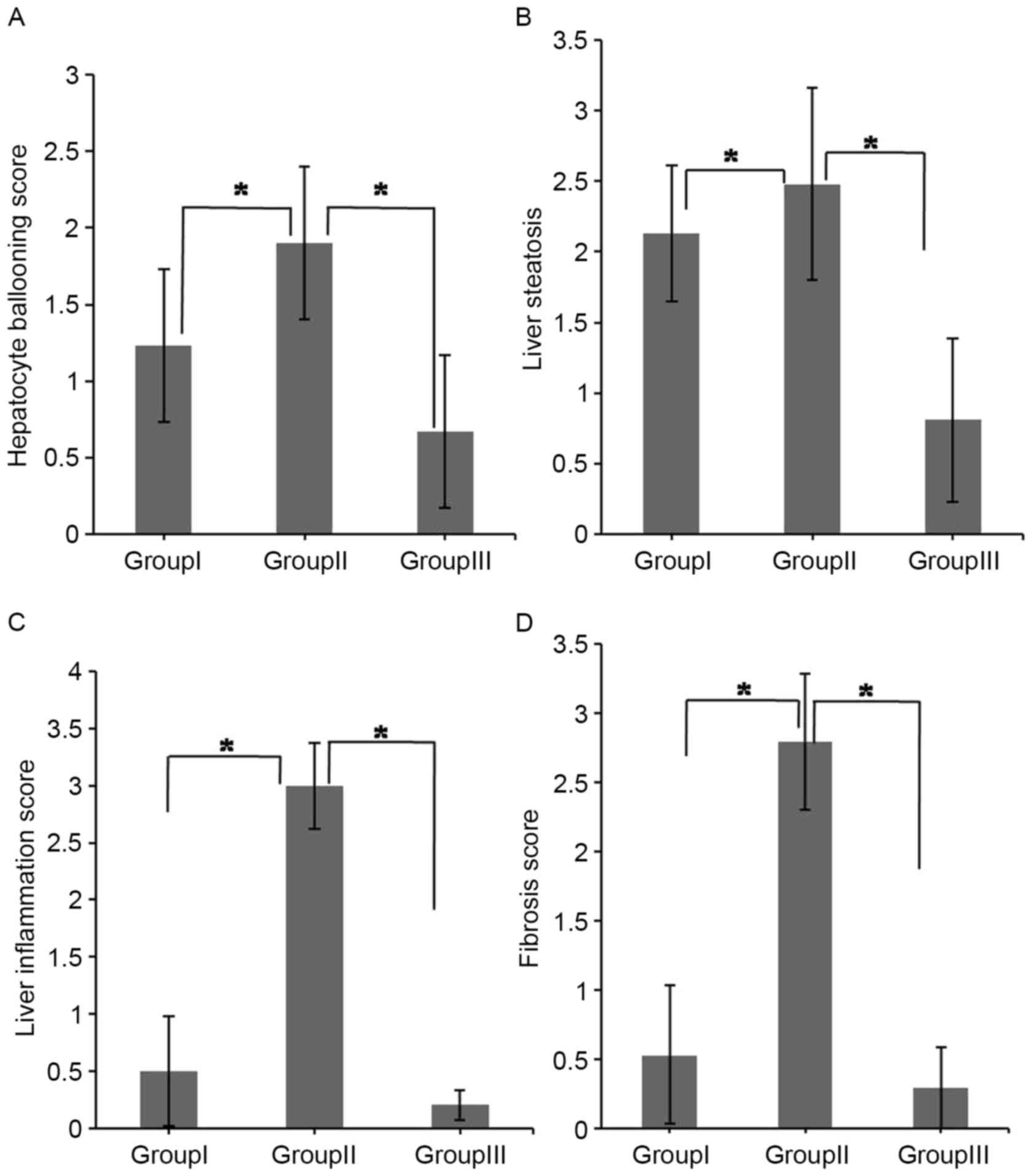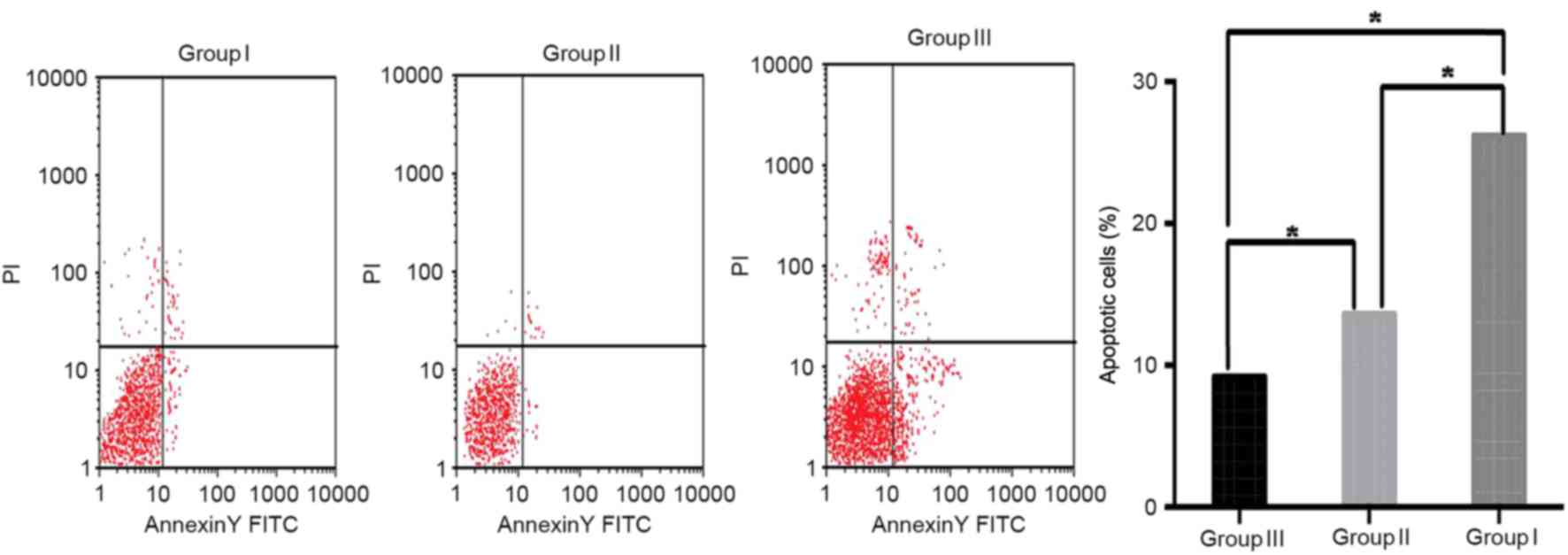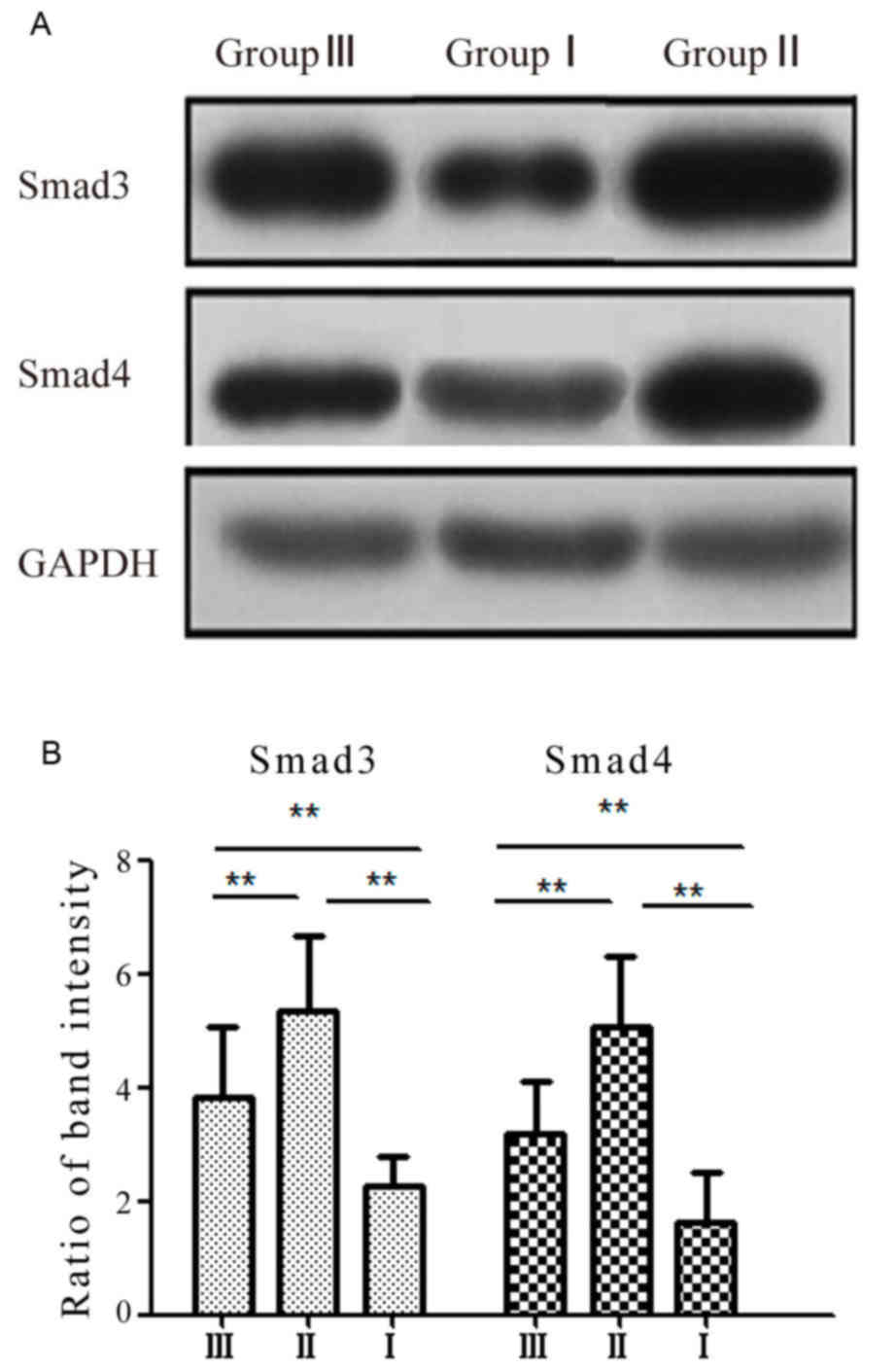|
1
|
Blachier M, Leleu H, Peck-Radosavljevic M,
Valla DC and Roudot-Thoraval F: The burden of liver disease in
Europe: A review of available epidemiological data. J Hepatol.
58:593–608. 2013. View Article : Google Scholar : PubMed/NCBI
|
|
2
|
Bataller R and Brenner DA: Liver fibrosis.
J Clin Invest. 115:209–218. 2005. View Article : Google Scholar : PubMed/NCBI
|
|
3
|
Szabo G and Bala S: Alcoholic liver
disease and the gut-liver axis. World J Gastroenterol.
16:1321–1329. 2010. View Article : Google Scholar : PubMed/NCBI
|
|
4
|
Wu ZW, Ling ZX, Lu HF, Zuo J, Sheng JF,
Zheng SS and Li LJ: Changes of gut bacteria and immune parameters
in liver transplant recipients. Hepatobiliary Pancreat Dis Int.
11:40–50. 2012. View Article : Google Scholar : PubMed/NCBI
|
|
5
|
Yang Y, Kim B, Park YK, Koo SI and Lee JY:
Astaxanthin prevents TGFβ1-induced pro-fibrogenic gene expression
by inhibiting Smad3 activation in hepatic stellate cells. Biochim
Biophys Acta. 1850:178–185. 2015. View Article : Google Scholar : PubMed/NCBI
|
|
6
|
Liu Q, Duan ZP, Ha DK, Bengmark S,
Kurtovic J and Riordan SM: Synbiotic modulation of gut flora:
Effect on minimal hepatic encephalopathy in patients with
cirrhosis. Hepatology. 39:1441–1449. 2004. View Article : Google Scholar : PubMed/NCBI
|
|
7
|
Lata J, Novotný I, Príbramská V, Juránková
J, Fric P, Kroupa R and Stibůrek O: The effect of probiotics on gut
flora, level of endotoxin and child-pugh score in cirrhotic
patients: Results of a double-blind randomized study. Eur J
Gastroenterol Hepatol. 19:1111–1113. 2007. View Article : Google Scholar : PubMed/NCBI
|
|
8
|
Shukla S, Shukla A, Mehboob S and Guha S:
Meta-analysis: The effects of gut flora modulation using
prebiotics, probiotics and synbiotics on minimal hepatic
encephalopathy. Aliment Pharmacol Ther. 33:662–671. 2011.
View Article : Google Scholar : PubMed/NCBI
|
|
9
|
Bauer TM, Schwacha H, Steinbrückner B,
Brinkmann FE, Ditzen AK, Aponte JJ, Pelz K, Berger D, Kist M and
Blum HE: Small intestinal bacterial overgrowth in human cirrhosis
is associated with systemic endotoxemia. Am J Gastroenterol.
97:2364–2370. 2002. View Article : Google Scholar : PubMed/NCBI
|
|
10
|
Maddrey WC: Alcohol-induced liver disease.
Clin Liver Dis. 4:115–131, vii. 2000. View Article : Google Scholar : PubMed/NCBI
|
|
11
|
Yan G, Li B, Xin X, Xu M, Ji G and Yu H:
MicroRNA-34a promotes hepatic stellate cell activation via
targeting ACSL1. Med Sci Monit. 21:3008–3015. 2015. View Article : Google Scholar : PubMed/NCBI
|
|
12
|
Jarzembowski T, Daca A, Bryl E, Wiśniewska
K, Gołębiewska J, Dębska-Ślizień A, Rutkowski B and Witkowski J:
Increased pheromone cCF10 expression in Enterococcus faecalis
biofilm formed by isolates from renal transplant patients. Curr
Microbiol. 65:656–659. 2012. View Article : Google Scholar : PubMed/NCBI
|
|
13
|
Li L, Wu Z, Ma W, Yu Y and Chen Y: Changes
in intestinal microflora in patients with chronic severe hepatitis.
Chin Med J (Engl). 114:869–872. 2001.PubMed/NCBI
|
|
14
|
Schreiber S, Rosenstiel P, Albrecht M,
Hampe J and Krawczak M: Genetics of Crohn disease, an archetypal
inflammatory barrier disease. Nat Rev Genet. 6:376–388. 2005.
View Article : Google Scholar : PubMed/NCBI
|
|
15
|
Housset C and Guéchot J: Hepatic fibrosis:
Physiopathology and biological diagnosis. Pathol Biol (Paris).
47:886–894. 1999.(In French). PubMed/NCBI
|
|
16
|
Liao SL, Kao TK, Chen WY, Lin YS, Chen SY,
Raung SL, Wu CW, Lu HC and Chen CJ: Tetramethylpyrazine reduces
ischemic brain injury in rats. Neurosci Lett. 372:40–45. 2004.
View Article : Google Scholar : PubMed/NCBI
|
|
17
|
Nozaki Y, Fujita K, Wada K, Yoneda M,
Kessoku T, Shinohara Y, Imajo K, Ogawa Y, Nakamuta M, Saito S, et
al: Deficiency of iNOS-derived NO accelerates lipid
accumulation-independent liver fibrosis in non-alcoholic
steatohepatitis mouse model. BMC Gastroenterol. 15:422015.
View Article : Google Scholar : PubMed/NCBI
|
|
18
|
Reyes-Gordillo K, Shah R,
Arellanes-Robledo J, Hernández-Nazara Z, Rincón-Sánchez AR, Inagaki
Y, Rojkind M and Lakshman MR: Mechanisms of action of acetaldehyde
in the up-regulation of the human α2(I) collagen gene in hepatic
stellate cells: Key roles of Ski, SMAD3, SMAD4, and SMAD7. Am J
Pathol. 184:1458–1467. 2014. View Article : Google Scholar : PubMed/NCBI
|
|
19
|
O'Reilly S, Ciechomska M, Cant R and van
Laar JM: Interleukin-6 (IL-6) trans signaling drives a
STAT3-dependent pathway that leads to hyperactive transforming
growth factor-β (TGF-β) signaling promoting SMAD3 activation and
fibrosis via Gremlin protein. J Biol Chem. 289:9952–9960. 2014.
View Article : Google Scholar : PubMed/NCBI
|
|
20
|
Sun YB, Qu X, Li X, Nikolic-Paterson DJ
and Li J: Endothelial dysfunction exacerbates renal interstitial
fibrosis through enhancing fibroblast Smad3 linker phosphorylation
in the mouse obstructed kidney. PLoS One. 8:e840632013. View Article : Google Scholar : PubMed/NCBI
|
|
21
|
Huang XZ, Wen D, Zhang M, Xie Q, Ma L,
Guan Y, Ren Y, Chen J and Hao CM: Sirt1 activation ameliorates
renal fibrosis by inhibiting the TGF-β/Smad3 pathway. J Cell
Biochem. 115:996–1005. 2014. View Article : Google Scholar : PubMed/NCBI
|
|
22
|
Schwartze JT, Becker S, Sakkas E, Wujak
ŁA, Niess G, Usemann J, Reichenberger F, Herold S, Vadász I, Mayer
K, et al: Glucocorticoids recruit Tgfbr3 and Smad1 to shift
transforming growth factor-β signaling from the Tgfbr1/Smad2/3 axis
to the Acvrl1/Smad1 axis in lung fibroblasts. J Biol Chem.
289:3262–3275. 2014. View Article : Google Scholar : PubMed/NCBI
|
|
23
|
Zhu JN, Chen R, Fu YH, Lin QX, Huang S,
Guo LL, Zhang MZ, Deng CY, Zou X, Zhong SL, et al: Smad3
inactivation and MiR-29b upregulation mediate the effect of
carvedilol on attenuating the acute myocardium infarction-induced
myocardial fibrosis in rat. PLoS One. 8:e755572013. View Article : Google Scholar : PubMed/NCBI
|
|
24
|
Lv KY, Zhong QS, Liu XF, Zhu SH, Xiao SC,
Wang GY, Ma B and Xia ZF: Deficiency of Smad3 results in enhanced
inducible nitric oxide synthase-mediated hypotension in
lipopolysaccharide-induced endotoxemia. J Surg Res. 187:640–645.
2014. View Article : Google Scholar : PubMed/NCBI
|
|
25
|
Ji F, Fu SJ, Shen SL, Zhang LJ, Cao QH, Li
SQ, Peng BG, Liang LJ and Hua YP: The prognostic value of combined
TGF-β1 and ELF in hepatocellular carcinoma. BMC Cancer. 15:1162015.
View Article : Google Scholar : PubMed/NCBI
|
|
26
|
Kamato D, Burch ML, Piva TJ, Rezaei HB,
Rostam MA, Xu S, Zheng W, Little PJ and Osman N: Transforming
growth factor-β signalling: Role and consequences of Smad linker
region phosphorylation. Cell Signal. 25:2017–2024. 2013. View Article : Google Scholar : PubMed/NCBI
|















